 Petzlover
Petzlover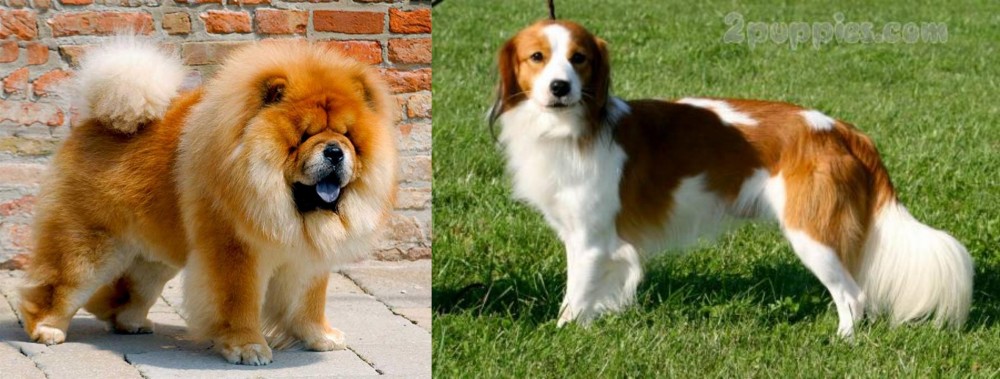 Chow Chow is originated from China but Kooikerhondje is originated from Netherlands. Chow Chow may grow 11 cm / 5 inches higher than Kooikerhondje. Chow Chow may weigh 21 kg / 47 pounds more than Kooikerhondje. Both Chow Chow and Kooikerhondje has almost same life span. Both Chow Chow and Kooikerhondje has almost same litter size. Chow Chow requires High Maintenance. But Kooikerhondje requires Low Maintenance
Chow Chow is originated from China but Kooikerhondje is originated from Netherlands. Chow Chow may grow 11 cm / 5 inches higher than Kooikerhondje. Chow Chow may weigh 21 kg / 47 pounds more than Kooikerhondje. Both Chow Chow and Kooikerhondje has almost same life span. Both Chow Chow and Kooikerhondje has almost same litter size. Chow Chow requires High Maintenance. But Kooikerhondje requires Low Maintenance
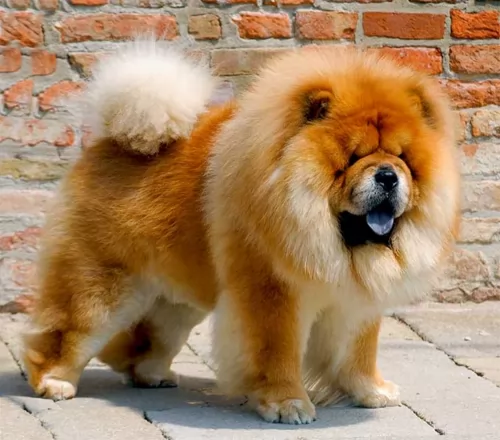 Northern China is the original home of the Chow Chow. In that region of China, the breed was known as the Songshi Quan – “the puffy-lion” dog. They have also been known in China as the “Dog of the Tang Empire” or the Tang Quan. The Chow is believed to be an ancient breed that the Foo Dog, or stone dog guardians of Buddhist palaces and temples, is modeled after. It is one of the most ancient of dog breeds that are still around today.
Northern China is the original home of the Chow Chow. In that region of China, the breed was known as the Songshi Quan – “the puffy-lion” dog. They have also been known in China as the “Dog of the Tang Empire” or the Tang Quan. The Chow is believed to be an ancient breed that the Foo Dog, or stone dog guardians of Buddhist palaces and temples, is modeled after. It is one of the most ancient of dog breeds that are still around today.
It is believed that they have existed for around 2000 years or perhaps even as far back as 3000 years, starting out in Mongolia and migrating to China. The ancientness of the Chow Chow has been validated through DNA testing. In China all those centuries ago, the Chow Chow was born to be a working dog. They hunted, herded, guarded and pulled carts. They went on quests with the Mongolian armies when China was invaded, as well as when the Mongolians invaded the Middle East and Europe later on.
Today’s Canadian Kennel Club has about 350 Chows registered while the AKC gets 10,000 new registrations every year.
 The Kooikerhondje is of Dutch ancestry and is a medium-sized spaniel-type dog breed that has always been a working dog, being used to attract ducks into traps but being bred as an all-purpose dog.
The Kooikerhondje is of Dutch ancestry and is a medium-sized spaniel-type dog breed that has always been a working dog, being used to attract ducks into traps but being bred as an all-purpose dog.
They were particularly sought after in the 17th and 18th century, appearing in paintings of Rembrandt. The breed died out during World War II, but it was rescued by Baroness van Hardenbroek van Ammerstol and recognized by the Dutch Kennel Club.
In January 2018 the Nederlnadse Kooikerhondje is fully recognized by the American Kennel Club, competing in the Sporting Group.
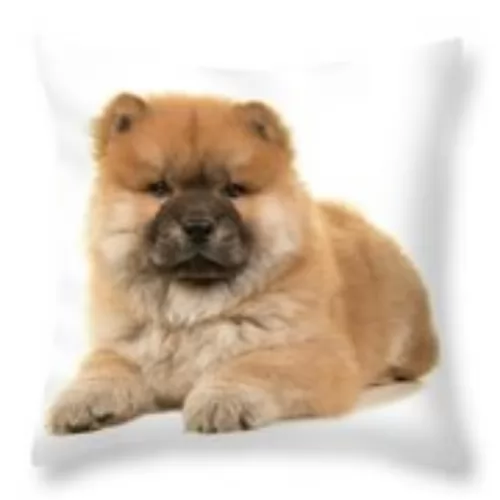 The Chow really does look like a small lion with a black tongue. The dog is sturdy and square with erect, small ears on a broad skull. They have a very dense double coat. Their eyes are deep set and look like almonds, while they all have that very distinctive purple or black tongue. Their lips are also distinctive with their blue color. The nose is black, but some Chows might have a blue nose. The tail is curly.
The Chow really does look like a small lion with a black tongue. The dog is sturdy and square with erect, small ears on a broad skull. They have a very dense double coat. Their eyes are deep set and look like almonds, while they all have that very distinctive purple or black tongue. Their lips are also distinctive with their blue color. The nose is black, but some Chows might have a blue nose. The tail is curly.
These are medium size dogs when it comes to height and weight, but they are powerfully built for their size. Their power is in their compact body holding the energy and strength of a much larger dog. Its hind legs are almost entirely straight, unusual for any dog. They get their lion appearance from the huge ruff that stands behind their heads. Their chest is broad and deep.
 The Kooikerhondje is a medium sized dog standing at 35 – 40cm at the withers and weighing anything between 9 – 11kg. He has a medium length coat which is a red and white color, with floppy ears.
The Kooikerhondje is a medium sized dog standing at 35 – 40cm at the withers and weighing anything between 9 – 11kg. He has a medium length coat which is a red and white color, with floppy ears.
A distinctive feature with this dog is the black tips of the long ears, and which are referred to as earrings. The coat can be wavy or straight. Typical of spaniel-like dog his plumed white tail moves jauntily, as though always happy. When you look at him he has a gentle expression, while being alert too.
Friendly, content, cheerful, good-natured and quiet – these are some of the words which describe the amicable Kooikerhondje.
He is also intelligent, wanting to please his owner. He is good around children too, but make sure your children are taught to respect and be kind to animals.
The Kooikerhondje is an adaptable dog and can be as as quiet or as jaunty as you want. He is adaptable to city life or life in the country, but he will need to be exercised and taken for walks.
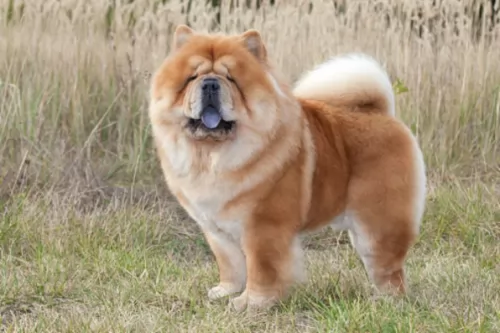 Loyal and true to their family and those they know; the Chow Chow is a little standoffish with strangers. They are very protective and usually attach themselves to one or two people. They are intelligent but stubborn, which can affect your training with them. They need to respect their people and Chows respect hose who take care of them. They can be aggressive toward dogs of their same sex especially if those dogs are the same breed as well.
Loyal and true to their family and those they know; the Chow Chow is a little standoffish with strangers. They are very protective and usually attach themselves to one or two people. They are intelligent but stubborn, which can affect your training with them. They need to respect their people and Chows respect hose who take care of them. They can be aggressive toward dogs of their same sex especially if those dogs are the same breed as well.
They are known to be very clean and many have compared them to cats in that regard. They appear to be dignified and refined. They are usually very quiet but very adaptable dogs.
 Kooiker, as he’s fondly referred to for short, has a happy personality, and bringing him into your home will be like bringing in some joy and sunshine.
Kooiker, as he’s fondly referred to for short, has a happy personality, and bringing him into your home will be like bringing in some joy and sunshine.
He is a fun, energetic companion and you can count him in for all your outdoor activities such as walk, hikes and swimming. He’ll love to fetch every ball you throw, and that’s because he is such a playful dog.
He is a loving dog too, making a great playmate for children. Treat him like one of the family, and the Kooiker will surprise you with the amount of pleasure he brings.
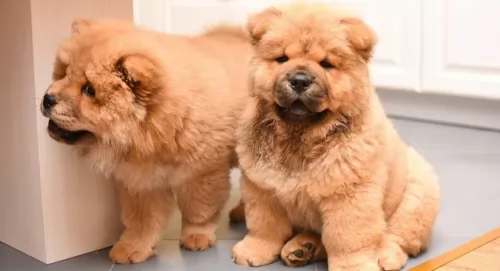 Although an ancient breed that obviously has survived many centuries of trials, the Cho Chow of today is prone to several different health conditions. These include:
Although an ancient breed that obviously has survived many centuries of trials, the Cho Chow of today is prone to several different health conditions. These include:
This condition can require surgery to keep the turning eyelid from injuring the eye ball.
This can cause lameness and arthritis.
This can cause lameness and arthritis.
Make sure you keep the ears clean and keep an eye on them.
 The lifespan of the Kooikerhondje is about 12 – 14 years, and looked after well, he can be your canine friend for many years.
The lifespan of the Kooikerhondje is about 12 – 14 years, and looked after well, he can be your canine friend for many years.
He loves his food and can put on weight easily, and obesity is one of the health problems he may have to deal with. Kidney- and eye problems might also be something that you may have to deal with with this dog breed, although most unlikely.
Obesity in dogs is very sad because its a disease that can be avoided. Dogs that are over fed are at particular risk because they can't exercise, and this in itself can lead to serious health issues.
There are different causes of obesity, but it is mostly caused by the dog being fed- and eating more than he can expend. Just like with humans, obesity becomes more common in old age as the metabolism slows down. A dog that has been neutered or spayed also tends to put on weight more easily.
If you're unsure what to do for your obese dog, speak to your vet who can recommend a diet for your pet. Remember that with feeding your dog, prevention is better than cure.
Kidney problems, though more common with older dogs, can strike at any age. The kidneys play a host of important functions such as regulating blood pressure. Sometimes kidney failure is slow and the symptoms may not be obvious.
With renal failure, your pet will be lethargic, they will be vomiting, be depressed and have weight loss. Other possible symptoms are increased thirst, blood in the urine and seizures. Chronic renal failure can't be cured but treatment is aimed at making your pet comfortable.
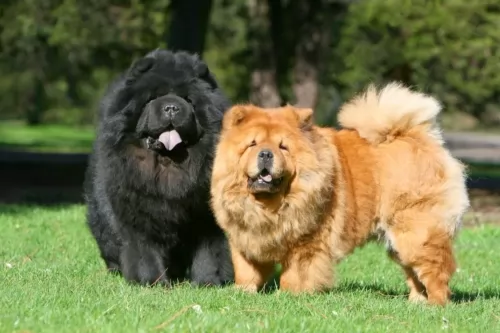 Don’t overfeed a Chow Chow as they are hard workers and big eaters. Feed them at least twice a day.
Don’t overfeed a Chow Chow as they are hard workers and big eaters. Feed them at least twice a day.
This eye disease can lead to blindness if not checked and treated.
These can be removed from an adolescent puppy.
Again, the Chow is susceptible to cancer.
Can lead to heart or kidney problems if left untreated.
Keep a close eye on your Chow Chow skin.
The Chow Chow was developed as working dog, but today’s version is more laid back and doesn’t need excessive exercise. Daily walks will suffice. They live very happily in the city if walked regularly. They are not really a competitive breed outside of obedience and confirmation. They are seldom seen in sports like agility or frisbee.
 Your Kooikerhondje is smart, happy-go-lucky dog and it is important to know your pet's needs so you can care properly for him. Exercise your Kooikerhondje daily as he is a high-energy dog and even short walks can be good for him.
Your Kooikerhondje is smart, happy-go-lucky dog and it is important to know your pet's needs so you can care properly for him. Exercise your Kooikerhondje daily as he is a high-energy dog and even short walks can be good for him.
He absolutely loves balls games too. He can live in the city or the country but will do better when he has the chance for exercise. Urban- and city environments can work if there are nearby parks to cater for his energy.
The Kooikehondje has long hair but he is surprisingly low maintenance and will simply require a brush once or twice a week.
If you love your pet but just can't find the time to see to his grooming needs, take him to the vet for regular checkups to check ears, teeth and eyes. They can come down with problems with the eyes or have some or other skin allergy.
Give your Kooikerhondje the right food, and make sure its the highest quality. If you buy him commercially manufactured food, pay attention to the ingredients list and make sure that proper meat is at the top of the list.
Add cooked chicken, brown rice and vegetables to his dry kibble as a tasty treat sometimes. Learn to recognize the less nutritious ingredients such as wheat or grain. Also learn to avoid foods which are bad for your dog such as chocolate and onions.